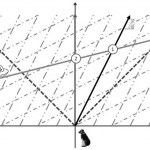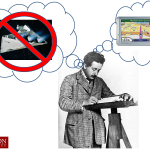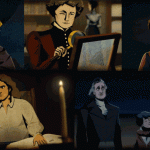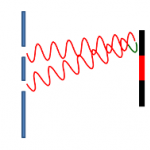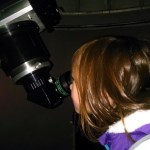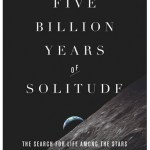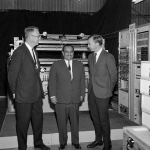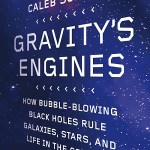Astronomy
This coming fall term, I'll be teaching Astronomy 052, "Relativity, Black Holes, and Quasars," because the guy who has traditionally taught it (a radio astronomer who studies active galactic nuclei) has to do other courses instead. But I said "Well, hell, I've written a popular audience book explaining relativity. I can teach that." And since I get to make teaching assignments (the one and only positive feature of being department chair), well, I put myself down to teach it. Now, of course, I find myself thinking about ideas for that class, months in advance, when I ought to be working on…
Last week's talks were using sci-fi space travel as a hook to talk about relativity, and my original idea for the talk was to explain how faster-than-light travel ultimately ends up violating causality. Some observers will see effects happening before the events that cause them, and that's just weird. In How to Teach Relativity to Your Dog, the illustration I use is a stationary dog watching a cat moving by at half the speed of light and a space alien zipping past at four times the speed of light. In that scenario, the dog can hand a water balloon to the passing alien to soak the cat, and…
Below you'll find the slides from my Physics Day presentations at Space Center Houston, embedded via SlideShare. I was doing the TED-style minimal text thing, so they're probably not all that comprehensible on their own.
The event was supposed to have a pop-culture connection, so I decided to use space travel and extrasolar planets as a hook for talking about relativity, thus all the movie images near the beginning. The original idea I had was to look at different fictional ways of evading the ban on faster-than-light travel, but they wanted something more in the half-hour range than the hour…
Back when the first episode of the Cosmos reboot aired, somebody put together a composite of the cartoon people who flashed on screen, and we played a guessing game on Twitter. The image above is from a blog post by Meg at True Anomalies, and I think it was probably her, but the ephemeral nature of Twitter makes it annoying to track down the original discussion.
Anyway, we collectively got four of the five right: ibn al-Haytham in the upper left, Annie Jump Cannon in the middle top, Isaac Newton on the lower left, and William Herschel on the lower right. Well, five of six, if you include…
A diabolical psychologist brings a mathematician in for an experiment. The mathematician is seated in a chair on a track leading to a bed on which there is an extremely attractive person of the appropriate gender, completely naked. The psychologist explains "This person will do absolutely anything you want, subject to one condition: every five minutes, we will move your chair across one-half of the distance separating you."
The mathematician explodes in outrage. "What! It'll take an infinite time to get there. This is torture!" They storm out.
The next experimental subject is a physicist,…
Another Monday, another recap of a new episode of the Cosmos reboot. This one was all about optics, and much of it was excellent. This was in part due to the fact that its first couple of historical segments focused on non-Western figures, and I don't know as much about their background to be able to nitpick. First up was Mozi, a Chinese philosopher from circa 400BCE, who may have been the first to demonstrate the camera obscura technique of projecting images from a pinhole in the wall of a dark room. He was followed by ibn al-Haytham, circa 1000CE, who did the first fairly complete analysis…
The fourth episode of the Cosmos reboot aired last night, and as I said on Twitter it was a beautiful demonstration of why I'm finding this show intensely frustrating. There were flashes of brilliance, but also quite a few bits that left me shaking my head. Thus fitting the pattern of the previous episodes-- I didn't comment on last week's, because I was taking a break, but it had the same sorts of issues, too-- so I guess that's just what this show is.
Again, there was some very good stuff-- the opening framing device with William Herschel talking about ghosts was great, and Tyson's tour…
So, there was this big story in cosmology the other day-- Tom Levenson's write-up is very nice-- which has been hailed as one of the greatest discoveries since the last greatest discovery, blah, blah, blah. And now that a few days have passed, we're starting to see the inevitable backlash, ranging from detailed technical analyses of possible other explanations to more general musings about the nature of peer review. I'm not qualified to evaluate the former, so I'm going to talk a bit about the latter.
The title of that Atlantic post is "'One of the Greatest Discoveries in the History of…
"Daddy? How do you make water?"
"You mean, what is it made of?"
"Yeah, what's water made of?"
"Hydrogen and oxygen."
"Oh. And what's hydrogen and oxygen?"
"They're chemical elements."
"So, when we drink water, we're drinking chemicals?"
"Well, yeah. In a sense, everything is chemicals. Water's a chemical, air is made of chemicals. "
"What about, like, wood?"
"Chemicals."
"What?!?! Is everything chemicals?"
"Pretty much, yeah."
"What about lights?"
"Light isn't a chemical, but the things that make light are made out of chemicals."
"Yeah, like, the Sun is fire, and it makes light, but is the…
This week's Cosmos was all about the evolution of life, and was viewed by millions of people outside of Oklahoma, where they presumably got an hour-long local news promo, or analysis of the Oklahoma State's chances in the NCAA Tournament. As such, it was a bit outside my area of expertise, but that never stopped a blogger before...
There were a couple of things about this that I thought were great, and two things that bothered me. The episode opened with a very nice discussion of the history of dogs and humans, demonstrating how dramatically untold generations of human selection have modified…
"So, that's the science show with space pictures. What did you think of it, honey?"
"Science. Space pictures. Awesome!"
Our umpteenth winter storm of the season delayed school two hours this morning, which is kind of the worst of all possible worlds from a parenting perspective-- when the schools are closed, there's (usually) a snow-day day-care program, but they don't take kids during a mere delay. On the bright side, though, it gave me a chance to show SteelyKid the Cosmos reboot from Sunday night. Her capsule review is at the top.
In a little more detail:
-- I asked her if she wanted to…
It says here in the fine print that my blogging license could be revoked if I fail to offer a public opinion on the Cosmos reboot, which premiered last night. I missed the first couple of minutes-- I had The Pip for bedtime, and he didn't start snoring until 8:58-- but saw most of it in real time. I posted a bit of commentary on Twitter, but will offer something marginally less ephemeral here.
The show opened and closed with tributes to Carl Sagan, and Neil deGrasse Tyson standing on the same cliff where Sagan opened the original series back in 1980. That was good and fitting, and Tyson's…
SteelyKid's class at her after-school day care has been learning about space for the last month or two (the program is very flexible-- the teachers ask the kids what they want to learn about, and then they spend however long on that topic the kids like), so we've been getting a lot of tidbits about astronomy related to us during car trips and dinner conversation. Last night, there was an open house at the Union College Observatory, so I picked her up a little early, and took her to campus to look through the big telescope (20-inch Cassegrain, for those who care about such things). This served…
It's taken me a disgracefully long time to finish the review copy of Lee Billings's Five Billion Years of Solitude I was sent back in the fall, mostly because I didn't read anything not immediately related to the book-in-progress for most of November and all of December. Which is to say, the long delay is not in any way a reflection of the quality of this book, which is excellent.
The title comes from the observation that the span from when life arose on Earth to the distant future when the expanding Sun will swallow the planet entirely is around five billion years. The span when the planet…
A couple of Mondays ago, I was at work and got the dreaded phone call from day care. "[The Pip]'s got conjunctivitis again. It's really bad, and he needs to go home right away."
Admittedly, this isn't the very worst phone call a parent could receive, but it's very much Not Good. Conjunctivitis means a trip to the doctor for antibiotics and eye drops (which The Pip HATES), and being sent home knocks out not only the rest of that day, but the entire next day, as he has to be on medication for at least 24 hours before he can return to day care.
The call came in around 10:00, and I had a class to…
My trip into the office today was for the express purpose of posting this job ad:
We invite applications for Visiting Assistant Professor starting in September 2014. This position is available for up to three years, contingent on satisfactory performance. Applicants should have some teaching experience and a strong commitment to undergraduate education. Union is a highly selective, small (2200 students) liberal arts college with an engineering program, located in the Capital District of New York State, a region heavily engaged in science and R&D. The Department of Physics and Astronomy (…
In January of 1990, a friend and I designed the ultimate message to an alien civilization.
Okay, admittedly, this wan't a recognized scientific accomplishment. After all, in January of 1990, I was a freshman at Williams. The alien message we designed was part of a first-year Winter Study seminar class. Winter Study, for those not part of the Cult of the Purple Cow is the one-month January term sandwiched between the Fall and Spring semesters, and at the time, first-year students were required to take one of a handful of interdisciplinary seminar courses intended to introduce students to a…
In 1967, a team of scientists hauled a big pile of gear-- electronics, particle detectors, a giant slab of iron-- into the burial chamber at the base of one of the pyramids at Giza. This sounds like a scene from a science fiction or fantasy novel-- throw in the fact that their first attempt was interrupted by the Six Day War and you've got an element of a Tim Powers secret history story-- but the goal wasn't the opening of an interdimensional portal or the raising of the dead. Instead, they were using astrophysics to do archaeology: their detectors measured the number of cosmic ray particles…
Over at Galileo's Pendulum, Matthew Francis expresses an opinion that's sure to get him in trouble with the Inquisition and placed under house arrest: Carl Sagan's Cosmos isn't all that:
However, even taking into account the differences in TV between 1980 and 2013, the show is very slow-paced at times. I’m not talking about the mellow oh-so-1970s Vangelis score, or Sagan’s measured style of speech: I mean the obvious stretching of material to make hour-long episodes. I have a long attention span, so I’m not saying Cosmos should be like the frenetic Star Trek reboot; I’m just saying that a…
The last week or so of silence on the blog has been due to my trip to Ohio (which was very enjoyable), and a lack of child care for the early part of this week. A day and a half home with both kids was just exhausting, but the trip was useful in that it provided me time to read Gravity's Engines by Caleb Scharf, on the plane to and from Columbus (I got the paper edition at Science Online, and figured as long as I had a printed book I wanted to read, I might as well dodge the stupid argument about whether my Nook is likely to interfere with the plane's navigation systems).
This book comes with…

